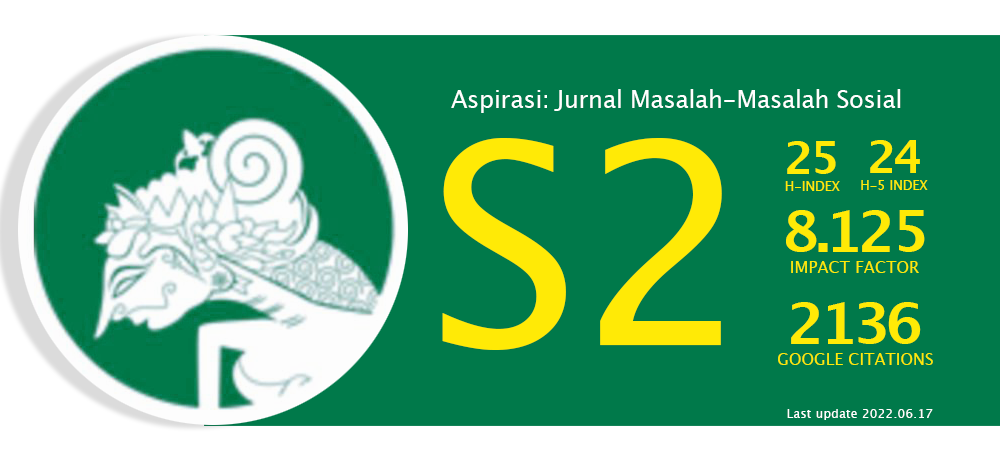Bencana Covid-19: Stresor bagi Pasangan Suami Istri di Indonesia
Abstract
The Covid-19 disaster has become a stressor for married couples because it triggers economic, psychological problems, and increases the burden of household domestic work. The purpose of this paper is to get a picture of the stress of married couples in Indonesia facing the Covid-19 pandemic and an overview of their strategies to deal with it. To fulfil this objective, the researcher used the literature review method which was later analyzed using the theory of stress and disasters. The Covid-19 disaster has proven stressful for married couples in Indonesia. However, most of them still try to maintain their marriage. This is in line with Bowlby’s theory that people respond to stress by seeking closeness with their loved ones, getting together, and supporting each other through stress, maintaining marital bonds. Home is recognized as the safest way to avoid threats as well as a place to focus on happiness with family.
Abstrak
Bencana Covid-19 menjadi stresor bagi pasangan suami istri karena memicu permasalahan ekonomi, psikis, serta bertambahnya beban pekerjaan domestik. Tujuan dari tulisan ini adalah untuk mendapatkan gambaran stres pasangan suami istri di Indonesia menghadapi pandemi Covid-19 dan gambaran strategi mereka untuk mengatasinya. Untuk memenuhi tujuan ini, peneliti menggunakan metode tinjauan pustaka untuk kemudian ditelaah dengan menggunakan teori stres dan bencana. Bencana Covid-19 terbukti membuat pasangan suami istri di Indonesia menjadi stres. Namun demikian, sebagian besar dari mereka tetap berupaya mempertahankan pernikahan. Hal ini sejalan dengan teori Bowlby bahwa orang-orang merespons stres dengan mencari kedekatan bersama orang-orang yang mereka cintai, berkumpul bersama, dan saling mendukung melalui stres, mempertahankan ikatan pernikahan. Rumah disadari menjadi cara paling aman untuk menghindari ancaman sekaligus menjadi tempat untuk memusatkan kebahagiaan bersama keluarga.
Keywords
Full Text:
PDFReferences
Atwater, E. (1983). Psychology of Adjustment: Personal Growth In A Changing World. 2nd.ed. New Jersey: Prentice-Hall, Inc.
Beach, S. R. H., & O’Leary, K. D. (1993). Dysphoria and marital discord: Are dysphoric individuals at risk for marital adjustment? Journal of Marital and Family Therapy, 19, 355–368.
BNPB. (2020, April, 13). Presiden Tetapkan COVID-19 sebagai Bencana Nasional. Diakses dari https://bnpb.go.id/berita/presiden-tetapkan-covid19-sebagai-bencana-nasional#:~:text=JAKARTA%20%2D%20Presiden%20Joko%20Widodo%20secara,%2D19)%20Sebagai%20Bencana%20Nasional.
Bowlby, J. (1988). A secure base: Clinical applications of attachment theory. London: Routledge.
Catriana, E., Ulya, F.N., Idris, M., Fauzia, M., Setiawan, S.R.D., Uly, Y.A. (2020, Agustus, 3). Indonesia Menuju Resesi. Kompas.com. Diakses dari https://jeo.kompas.com/indonesia-menuju-resesi-pertama-sejak-1998#utm_source=kompas.com&utm_medium=kgnotif&utm_campaign=update pertumbuhan-ekonomi-kuartal-ii-2020-terendah-sejak-1999-indonesia-menuju-resesi&message_id=22685a32-7fd5-4c01-b5cf-1c16e2fb8f1a&received_count=1.
Cohan, C. L., & Cole, S. (2002). Life course transitions and natural disaster: Marriage, birth, and divorce following Hurricane Hugo. Journal of Family Psychology, 16, 14–25.
Cohan, C.L., Cole, S. W., & Schoen, Rt. (2009). Divorce Following the September 11 Terrorist Attacks. Journal of Social and Personal Relationship, 26(4), 512-530.
Davila, J., & Bradbury, T. N. (1998). Psychopathology and the marital dyad, dalam L. L’Abate (Ed.), Family psychopathology: The relational roots of dysfunctional behavior (hlm. 127–157). New York: Guilford Press.
Florian, V., Mikulincer, M., & Hirschberger, G. (2002). The anxiety-buffering function of close relationships: Evidence that relationship commitment acts as a terror management mechanism. Journal of Personality and Social Psychology, 82, 527-542.
Grasha, A.F., Kirschenbaum, D.S. (1980). Psychology of Adjustment and Competence : Social isolation and loneliness. Cambridge: Winthrop Publishers
Gugus Tugas Percepatan Penanganan Covid-19. (2020, September, 8). Peta Sebaran Covid-19. Diakses dari https://covid19.go.id/peta-sebaran.
Hazan, C., & Shaver,P.R. (1994). Attachment as an organizational framework for research on close relationships. Psychological Inquiry, 5, 1-22.
Hirschberger, G., Florian, V., & Mikulincer, M. (2003). Strivings for romantic intimacy following partner complaints or partner criticism: A terror management perspective. Journal of Social and Personal Relationships, 20, 675-687.
Karney, B.R., & Bradbury, T.N. (1995). The longitudinal course of marital quality and stability: A review of theory, method, and research. Psychological Bulletin, 118, 3-34.
Kementerian Kesehatan. (2020, Juni, 19). Menuju Adaptasi Kebiasaan Baru. Kemkes.go.id. Diakses dari http://promkes.kemkes.go.id/menuju-adaptasi-kebiasaan-baru.
Keputusan Menteri Kesehatan Nomor HK.01.07/Menkes/328/2020 tentang Panduan Pencegahan dan Pengendalian Corona Virus Disease 2019 (Covid-19) di Tempat Kerja Perkantoran dan Industri dalam Mendukung Keberlangsungan Usaha pada Situasi Pandemi.
Keputusan Presiden Nomor 11 Tahun 2020 tentang Penetapan Kedaruratan Kesehatan Masyarakat terkait Covid-19.
Keputusan Presiden Nomor 12 Tahun 2020 tentang Penetapan Bencana Nonalam Penyebaran Corona Virus Disease 2019 (Covid-19) Sebagai Bencana Nasional.
Lipman-Blumen, J. (1975). A crisis framework applied to macrosociological family changes: Marriage, divorce, and occupational trends associated with World War II. Journal of Marriage and the Family, 37, 889-902.
Mikulincer, M., Florian, V., & Hirschberger, G. (2003). The existential function of close relationships: Introducing death into the science of love. Personality and Social Psychology Review, 7, 20-40.
Mikulincer, M., & Florian, V. (2000). Exploring individual differences in reactions to mortality salience: Does attachment style regulate terror management mechanisms? Journal of Personality and Social Psychology, 79, 260-273.
Mukaromah, V.F. (2020, September, 1). Melihat Peningkatan Kasus Covid-19 di Indonesia Dari Bulan Ke Bulan. kompas.com. Diakses dari https://www.kompas.com/tren/read/2020/09/01/200200165/melihat-peningkatan-kasus-covid-19-di-indonesia-dari-bulan-ke-bulan?page=all.
Nugraheny, D.E. (2020, April, 14). PSBB Di Indonesia 10 Daerah Disetujui 5 Ditangguhkan 2 Daerah Akan Ajukan. kompas.com. Diakses dari https://nasional.kompas.com/read/2020/04/14/06173261/psbb-di-indonesia-10-daerah-disetujui-5-ditangguhkan-2-daerah-akan-ajukan?page=all.
Pekerja Dirumahkan dan Kena PHK Akibat Corona Capai 305 Juta. cnnindonesia.com. Diakses dari https://www.cnnindonesia.com/ekonomi/20200720114203-92-526610/pekerja-dirumahkan-dan-kena-phk-akibat-corona-capai-305-juta.
Peraturan Menteri Kesehatan (Permenkes) Nomor 9 Tahun 2020 tentang Pedoman Pembatasan Sosial Berskala Besar (PSBB).
Peraturan Pemerintah Nomor 21 Tahun 2020 tentang Pembatasan Sosial Berskala Besar (PSBB) dalam Rangka Percepatan Penanganan Covid-19.
PDSKJI. (2020, Mei, 14). Masalah Psikologis di Era Covid-19. Diakses dari http://pdskji.org/home.
Pusat Penelitian dan Pengembangan KB dan KS Badan Kependudukan dan Keluarga Berencana Nasional & Institut
Pertanian Bogor. (2020). Survei Kondisi Keluarga Pada Masa
Pandemi Covid-19. Jakarta: BKKBN.
Robinson, D. L. (1997). Family stress theory: Implications for family health. Journal of the American academy of Nurse Practitioners, 9(1), 17-24.
Rosenblatt, Paul C., Anderson, Roxanne Marie., Johnson, Patricia A. (2010, Juni, 30). The Meaning of “Cabin Fever”. Diakses dari http://www.tandfonline.com/loi/vsoc20 University of Minnesota.
Sarafino, E.P. (1994). Health Psychology (2.Ed). New York: Willey.
Sekretariat Kabinet Republik Indonesia. (2020, April, 23). Total 2 Provinsi dan 21 Kabupaten Kota Termasuk Surabaya Kab Sidoarjo Serta Kab Gresik Terapkan PSBB. Diakses dari https://setkab.go.id/total-2-provinsi-dan-21-kab-kota-termasuk-surabaya-kab-sidoarjo-serta-kab-gresik-terapkan-psbb.
South, S. J. (1985). Economic conditions and the divorce rate: A time-series analysis of the postwar United States. Journal of Marriage and the Family, 47, 31–41.
Sunarti, E. (2020). Laporan Survei Ketahanan Keluarga. [PowerPoint Slides]
Surat Edaran Nomor HK.02.01/Menkes/335/2020 tentang Protokol Pencegahan Penularan Corona Virus Disease (Covid-19) di Tempat Kerja Sektor Jasa dan Perdagangan (Area Publik) dalam Mendukung Keberlangsungan Usaha.
Thakur, V., & Jain, A. (2020). COVID 2019-suicides: A global psychological pandemic. Brain, behavior, and immunity, 88, 952–953. https://doi.org/10.1016/j.bbi.2020.04.062
Yeung, W.J., & Hofferth, S.L. (1998). Family adaptations to income and job loss in the US. Journal of Family and Economic Issues, 19, 255-283.
Yossihara, A. (2020, September, 11). Covid-19 Makin Tak Terkendali. Kompas, hlm.15
DOI: https://doi.org/10.46807/aspirasi.v11i2.1755
Refbacks
- There are currently no refbacks.











